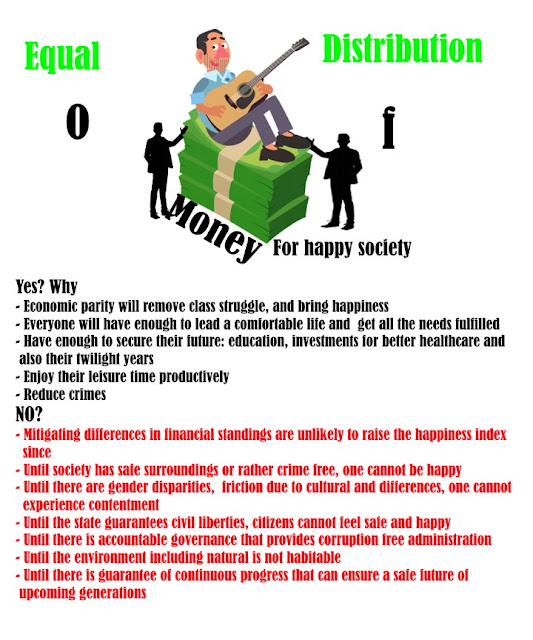Many believe that the best way to ensure a happier society is to reduce the difference in income earnings between the rich and poor. To what extent do you agree or disagree?
Yes? Why
Economic parity will remove class struggle, and bring happiness
Everyone will have enough to lead a comfortable life and get all the needs fulfilled
Have enough to secure their future: education, investments for better healthcare and also their twilight years
Enjoy their leisure time productively
Reduce crimes
NO?
Mitigating differences in financial standings are unlikely to raise the happiness index since
Until society has safe surroundings or rather crime free, one cannot be happy
Until there are gender disparities, friction due to cultural and differences, one cannot experience contentment
Until the state guarantees civil liberties, citizens cannot feel safe and happy
Until there is accountable governance that provides corruption free administration
Until the environment including natural is not habitable
Until there is guarantee of continuous progress that can ensure a safe future of upcoming generations
Can mitigation of financial variance among diverse cross-sections of society help raise the happiness index of a country is a million dollar question, and thus, needs a profound analysis to determine how far this notion is deemed as relevant.
Those who lobby for this arrangement find rationale for their opinion in the assumption that more even wealth distribution would help ensure that everyone has enough resources to survive and lead a comfortable life that sans struggle for earning daily bread and can instead focus on experiencing pleasure in their daily endeavors, mitigating inter class struggle.
For example, when one can afford materialistic possessions such as modern gadgets, cars and so on, they crave for, they will be satisfied, and this will reflect in their friendly interaction with those around them. Similarly, having enough to brave emergencies like medical, and prepare for a better future such as education and savings for twilight years, the social environment will exude confidence and there will be absence of despair.
On the contrary, the utopian dreams promoted in the former view lack substance. If only economic parity held the key to a content social environment, several societies that guarantee equivalence in availability of monetary resources would have enjoyable surroundings. It is not simply the uniformity in the dispersal of money but the absence of bias in society, based on gender, religion, culture and ethnicity, to name a few, can fetch congenial social atmosphere. Similarly, until a country fails to extend civil liberties to its citizens, attaining a conducive social atmosphere will remain a far cry.
Overall, despite proportionate allocation of economic resources can play a role in attaining a fair level of contentment in a nation, one can ill-afford to overlook other factors: these are intricately entwined to each other.


